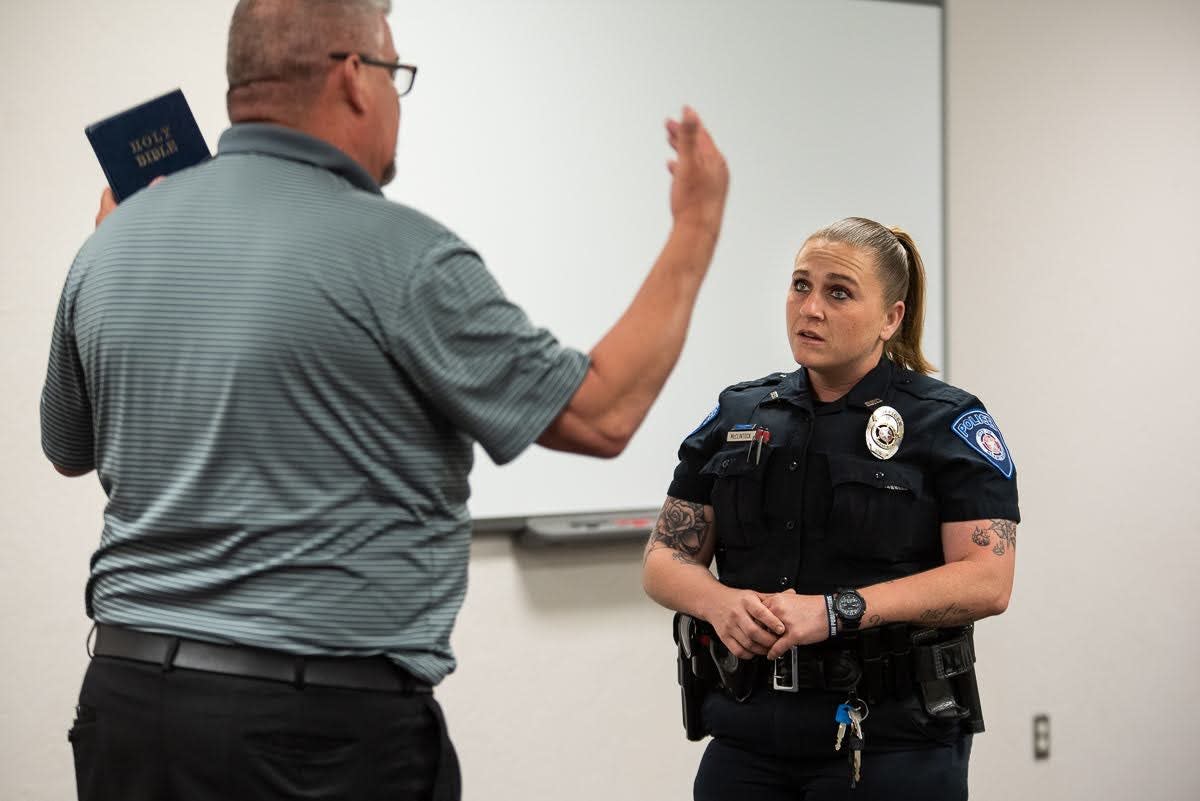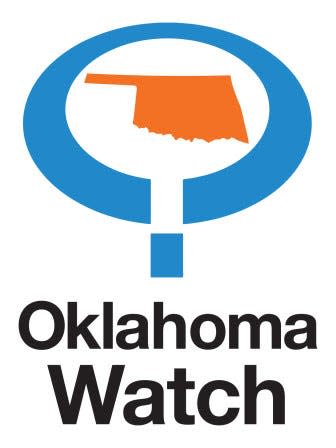Could new law change how Oklahoma police interact with those suffering from mental illness?

An Oklahoma City woman was hallucinating when she grabbed her mother’s sweatshirt and dragged her toward the front door, according to a police report. The woman yelled, “What did you do with my mother?” as she slammed her mother’s head into the wall and pushed her off the front porch.
Her mother told Oklahoma City police that her daughter had schizoaffective disorder and begged officers to take her for a mental health evaluation, which could result in forced treatment, interrupting three years of similar episodes.
Officers refused, according to the report. Police knocked on the front door, but the woman turned up the music she was playing and ignored them, the report states.
She was no longer hurting anyone. There was nothing officers could do.
Oklahomans with mental illness or substance abuse conditions can be detained for stabilizing treatment if they pose an immediate threat of harm to themselves or others. But the requirement that harm be immediate disqualifies many in need of help, leaving them to further deteriorate, often resulting in homelessness, incarceration, serious injury or death.
A Tulsa lawmaker aims to change that with House Bill 3451.

What is Oklahoma's civil commitment law?
Oklahoma is one of only six states whose civil commitment laws still mandate immediate or imminent threats, according to research from the Treatment Advocacy Center.
In a 2020 report, the Treatment Advocacy Center condemned Oklahoma’s law for requiring significant mental and physical deterioration before someone can be placed under an emergency hold.
“When you require an imminent standard, when you require deterioration, you are essentially saying, ‘get sicker and maybe we’ll get the right moment before you harm yourself,’” said Sabah Muhammad, senior legislative and policy counsel for the center. “And the question is, why isn’t your detachment from reality, from your ability to access your self-determination, why isn’t that deterioration harm enough?”
From July 1, 2022, to June 30, 2023, mental health providers approved 2,062 involuntary admissions at publicly funded treatment centers, according to data provided by the Oklahoma Department of Mental Health and Substance Abuse Services.
More: Why murder suspects are being released from mental facilities in Oklahoma
Law enforcement officers are the state’s default responders for someone in a mental health or substance abuse crisis. Armed police can escalate confusion and paranoia often leading to arrests and detention, where jailers with minimal training are responsible for their health and safety, which can have fatal consequences. A recent Oklahoma Watch investigation found that 28 jail detainees died from untreated mental health or substance use conditions in 2022.
When someone is taken into protective custody by police, they’re placed in handcuffs and taken to a hospital or crisis center for evaluation by a mental health professional who can admit eligible patients for up to five days. Those who need more than five days can be ordered to remain in treatment by a judge using the same criteria.
A bill filed last month could result in earlier intervention, reducing law enforcement encounters, arrests and long-term commitments. But it also means suspending people’s rights sooner.
Oklahoma Rep. Jeff Boatman proposes changes to civil commitment law
The proposal by Rep. Jeff Boatman, R-Tulsa, expands who is eligible for commitment to include someone who has a history of threatening or posing physical harm to themselves or others as a result of mental illness or substance abuse. It also includes extreme destruction of property as a reason for detention. House Bill 3451 is one of more than 2,000 new bills filed for the 2024 legislative session.
Brian Wilkerson, director of litigation and legal services for the Oklahoma Disability Law Center, said the law is intentionally narrow. Instead of adding reasons to detain someone, lawmakers should clarify the current language to ensure the danger someone poses warrants violating their rights, he said.
“The overriding thought has to be, ‘is it necessary to deny this person their civil liberties?’ however short that might be,” Wilkerson said. “It should be a last resort.”
Sen. Darrell Weaver, R-Moore, filed a bill that would strike the word immediate from the law. Boatman filed a similar bill in 2022, but Department of Mental Health officials told Boatman that without urgency the criteria were too broad. Boatman agreed to drop the bill until better language was developed.
More: OKC council approved operators for MAPS 4 Mental Health & Addiction project. Who are they?
Rep. Jared Deck, D-Norman, is working with Boatman on the new bill. The pair met Wednesday with about 25 mental health providers, hospital representatives, Department of Mental Health employees and policy researchers. Boatman said he filed the bill to initiate discussions about how to improve the law and will continue to update the proposal as more stakeholders weigh in.
“I’m just trying to give everybody making these decisions a little more leeway,” Boatman said. “At some point, we have to let judges be judges and mental health experts be mental health experts.”
Dewayne Moore works for the state Mental Health Department and teaches the law to cadets.
“This is one of the only exceptions where a person’s liberty can be taken away from them,” Moore said. “So, this criteria should be narrowly defined, balancing someone’s need for treatment with their constitutional rights.”
Moore said he isn’t opposed to changing the language of the law, but more important is training officers, mental health workers and judges to interpret it.
Kathy Wolff, of Weatherford, was a psychiatric nurse for more than 40 years, caring for kids in state custody and teaching nursing at Southwestern Oklahoma State University, where she was in charge of rotations for the psychiatric unit. Now, she is retired and advocates for changes to the law that would send more patients to emergency care.
“I support temporarily suspending their liberties to get them the help they desperately need,” Wolff said. “In this state of mind, they can’t make decisions about treatment or fend for themselves. Aren’t we taking away their right to care if we don’t help them?”
Hallucinations, delusions, paranoia and other symptoms can prevent people with acute mental illness or addiction from caring for themselves, Wolff said. At least half of patients with schizophrenia and 40% of patients with bipolar disorder also have a condition that makes them unaware of their diagnosis or the severity of it, hindering their ability to make treatment decisions, according to a National Institutes of Health report. Left untreated, those symptoms can lead to job loss, homelessness, substance abuse, suicidal thoughts or violent behavior.
“There could be a mental health center on every corner in Oklahoma and they wouldn’t go in because they don’t know they need to,” Wolff said. “Oklahoma is supposed to protect its citizens and we’re not doing that. We’re allowing them to suffer.”
Oklahoma needs to invest more in early mental health treatment, lawmaker says
Changes to the law would likely increase the number of patients receiving mental health crisis care, which means the state would need more providers and beds. A new mental health hospital planned for Oklahoma City will add 100 state-run beds and an urgent care center for people in crisis, according to the Mental Health Department’s website.
Increasing mental health workers and access to care are the aim of three more bills filed by Boatman. They would allow social workers to complete their licensure while working a full-time job; expand insurance coverage for behavioral healthcare; and fund psychiatric and psychological programs at Oklahoma State University Medical Authority.
Wilkerson said the state should invest more time and money to increase access to treatment earlier, reducing mental health emergencies and the need for crisis care.
In November 2022, the U.S. Department of Justice launched a probe into Oklahoma’s poor access to mental health care and Oklahoma City police response to crises.
“It’s a failure on us as a community in not providing those services on the front end,” Wilkerson said. “If we were doing that, we wouldn’t have to debate the merits of taking away someone’s freedom.”
Oklahoma Watch, at oklahomawatch.org, is a nonprofit, nonpartisan news organization that covers public-policy issues facing the state.
Whitney Bryen is an investigative reporter at Oklahoma Watch covering vulnerable populations. Her recent investigations focus on mental health and substance abuse, criminal justice, domestic violence and nursing homes. Contact her at 405-201-6057 or wbryen@oklahomawatch.org. Follow her on Twitter @SoonerReporter.
This article originally appeared on Oklahoman: New bill would change how Oklahoma handles involuntary holds

